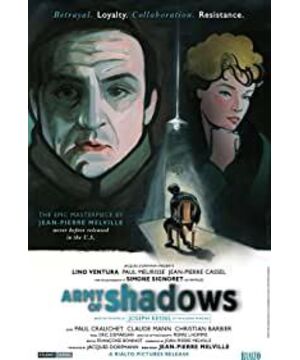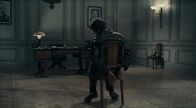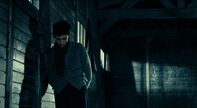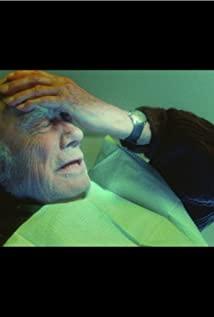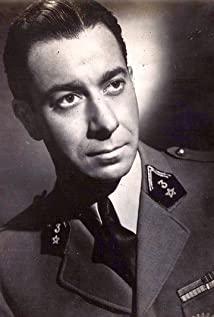In my opinion, Shadow Troopers is Melville's most outstanding work. The plot of the film is very simple: this is a story of members of the resistance movement in Marseille, led by Saint-Luc and Gépierre, including Matilde, François and other members, who died one after another in the struggle. The interesting thing is that all the revolutionaries in the film died, some were executed by their own people, some committed suicide, and some were killed by the enemy. But it doesn't show what they did to the invaders, in other words, the movie doesn't show them "how to resist" the German army at all, but only shows their death. Therefore, "Resistance Movement" is just a context, which puts the characters in a state of "living to death". Looking at the characters in the film, we find that the director describes the moral dilemma brought about by the death of the traitor, the philosopher The rational dilemma brought by the death of the poet and the intuitive dilemma brought by the death of the poet, the three dilemmas forced the audience into the abyss of thinking, and finally revealed his subtle and righteous theme.
Traitor's Death
Every French face that appears in "Shadow Army" is meaningful, and no one can describe the faces of warriors and traitors, men and women, leaders and members with only one or two adjectives. From the chilling atmosphere brought by the German honor guard walking through the Arc de Triomphe at the beginning of the film to the death of all resistance fighters at the end of the film, do you wonder if these faces really existed? Is there really such a story? Could it be that they are really just a shadow army?
This is the kind of doubt that the dead bring to the living. Of these doubts, the traitor's death seems to be the least objectionable. We are accustomed to the determination and pleasure of executing traitors in domestic movies. "Destroy you on behalf of the people" has become a spell to execute traitors. Interestingly, in the prosecution after the event, the traitors are often unable to withstand the temptation of material, beautiful, and official positions before they sway and rebel. This is also the narrative trick about Judas in the Bible. But in "Shadow Army", director Melville set up two killings of traitors at the beginning and the end of the film, and these two killings happened to constitute a moral dilemma in a special period.
The previous execution of the traitor Donald is a famous scene in film history, and everyone talks about Melville's surgically sketched depiction of a murder. From choosing the tools of execution, to discussing how to execute him, to the whole process of executing him, it really feels straightforward and compelling. But this can only be said to be the director's usual method. There are such elegant and meticulous crimes in "Red Circle", "Big Dawn" and "Second Breath". In my opinion, the purpose of this scene is twofold: one is to maximize the audience's sympathy. Yes, he is a traitor, but also a handsome French lad, a former revolutionary comrade. He was at his disposal like a lamb to be slaughtered, his eyes full of fear, until the fear condensed into tears of despair. The moment of execution was quite horrifying. In order to avoid being heard, the executioners hugged their legs and held their hands, strangling him in the most primitive way. There is a great deal of compassion for the murder in one go, and the executioners are clearly so shaken that they decide to carry cyanide with them and commit suicide to prevent betrayal. But is mercy all there is? Not also. Melville's long-term aim is to draw an analogy to the execution of Mathilde in the future.
Mathilde is the only female character in the film. She is bold, careful, shrewd, and very revolutionary. She went into the tiger's den twice to rescue the arrested comrade, and successfully rescued the hero Gepier. Any viewer will develop a deep relationship with this heroine of female middle school while watching the movie. But Mathilde's Achilles' heel is the maternal love she was born with as a woman, as a mother. She carried her daughter's photo with her, and when she was also arrested, the Germans threatened her daughter's safety, leading to Mathilde's eventual betrayal. So the question was placed in front of Gepier and the audience at the same time: Should Mathilde be executed?
For Gepier and others, the execution of Mathilde and Donald Trump are essentially the same. Yes, he and she were once gays, and Mathilde was Jepier's savior. It was true that there were differences within the resistance, but Saint-Luc with unquestionable reason - she could not be released without betrayal, although it is only natural for a mother to protect her daughter, but people are afraid of death - decided Marty Ed must die. Saint-Luc also pointed out that Mathilde himself would have chosen to be executed.
It is not so easy for the audience to accept this decision, because the audience has already established a relationship with her while watching, knows her past exploits, and the reason for her betrayal is maternal love, which is the foundation of human nature. Although we had anticipated her future betrayal when we learned that she was carrying her daughter's photo, it was hard to accept that she was also going to be executed. It dawned on us that the initial sympathy for the death of the traitor Donald was nothing more than our innate grief, sympathy, not grief. If we also knew about Donnat's past and the reasons for his betrayal, would it be as painful as the death of Mathilde? Could it be that the terrified look in Donald's eyes before his death was fundamentally different from the complex look in Mathilde's eyes before his death? Even if the betrayal cannot be forgiven, shouldn't we be full of hatred and pleasure like domestic movies?
Therefore, the two deaths of traitors seem unrelated, but they are actually moral dilemmas carefully set up by the director. This dilemma reflects how cruel the real situation of the resistance movement is, and it also supports the film's theme on the screen: how to face death in extreme times. We have reason to believe Saint-Luc's inference that Mathilde was executed voluntarily, because only in this way can the moral dilemma be resolved and her death given meaning.
Death of a Philosopher
The only one who repeatedly escaped from the death line is Gepier, the powerful hero of Kong Wu, who should have been a solitary hero often seen in such movies, with a strong character and rich experience. In this film, he was arrested twice and escaped successfully both times, and I even believed that he could survive the disaster. Judging from these plots alone, Gepier is a typical underground resistance leader. But Gepier's most interesting plot is the different endings in which he stands on the starting line of death twice.
During the second arrest, Gepier stood on the starting line with a group of death row prisoners. The German officers ordered them to run forward. Anyone who could run to the front marker before being killed by the machine gun behind him could not be executed for the time being. Delay until the next execution and race against the next batch of death row inmates. Gepier decided not to run, and the Germans gave an order, and almost all the prisoners ran away. Gepier stood on the spot, and his overwhelmed expression suggested his inner sway. At this time, the Germans fired a few shots at his feet. , He seemed to have woken up to something, and ran desperately. The race was a near miss for Gepier, because Mathilde fell from the sky like a goddess and rescued him with member Bizon.
But we can't help but ask: Why did Jepier not want to run in the first place? And why did you end up running?
During his last arrest, Jebier suffered the same fate. The final subtitle of the movie tells us that this time, he did not run and was beaten to death on the starting line.
This time, why did he finally choose not to run?
This is exactly where Jebiya looks like a philosopher. The film does not address his motivations for engaging in the Resistance, but we can still see how he differs from the rest of the members. For example, member Bizon is just a qualified and loyal killer; for example, Felix, who once said that there is "no reason" to join the resistance movement. But not Jebbie. Participating in the resistance movement was the only way of life for him to feel the legitimacy of existence in the extremely harsh and inhuman reality at the time. In other words, it was only the resistance movement that gave Jepiera a permanent sense of morality.
Let's go back to the beginning of the film, the first time Jebier was imprisoned with a group of people of different identities, including pharmacists, businessmen and puppet government soldiers. As soon as these people saw Jepiya, they complained that their detention was a pure injustice, because they were all good people and obedient people. Obviously, in the face of these people who want to be slaves to the subjugation of the country, Gepier suddenly stands on the commanding heights of morality and rationality. He has reason to despise these inmates, just like rational people despise the walking dead. Especially when he left with a confident smile on his face, mocking them for being a bunch of trash.
This confidence is the sense of existence he has acquired through the act of the Resistance. Therefore, he chose not to run for two reasons: firstly, in front of the Germans, by outperforming other Frenchmen to get the chance to delay his life, which is both immoral and humiliating; the second and most fundamental reason is that his Reason tells him that death is not terrible, and that life is worse than death is unbearable. He said inwardly, "I understand my mood, I'm relaxed, I don't want to run." It was this rationally generated morality that constituted the real motivation for his resistance movement.
In fact, Jepiya is not a philosopher, he is a disciple of a philosopher. Saint-Luc was the real philosopher. He was a Chen Duxiu or Qu Qiubai-style revolutionary who came from the study and used theory to guide his actions.
In the film, Saint-Luc's first appearance is the image of a scholar in the study. Borrowing the eyes of his younger brother François, we see the old French apartment, a luxurious study, with books on all sides, placed in alternate Head sculptures of musical masters and historical figures. Saint-Luc is like a born scholar, who only wants to live in troubled times. At this time, the background music also plays a symphony in a timely manner, making this study like a paradise. Francois always thought of his brother as a quiet scholar in his study, but he didn't know that he was also a senior leader of the resistance. In fact, François is not wrong, Saint-Luc is indeed a scholar, and several of the books he wrote are Gepier's Bible. In the film, Gepier took out these books full of emotion before he was arrested, including "Scientific Theory", "Axioms and Formalism", "Transfinite and Continuous Functions" and so on. Judging from the title, these books belong to the genre of 20th century mathematical philosophy, but those with a keen sense of smell must be able to smell the taste of the philosopher Kant: use transcendental pure reason to exercise moral imperatives, and use mathematically perfect logic to determine the mortal world event. Kant's epitaph says: "The only thing I look up to is the starry sky in the sky and the moral law in my heart." Therefore, Saint Luc, who is the incarnation of rationality in the film, guides revolutionary practice through this pure rationality. When he ordered the execution of Mathilde, he said that "reason is always right", which is his own situation.
But this rationality is inevitably regarded as cold-blooded. The same is true for Gepier. He executed traitors and called on everyone to bring their own cyanide, which showed the ruthlessness of reason: as long as it is morally rational, it must be done no matter how unacceptable it is emotionally, "God does not exist. of". But in my opinion, this is not cold-blooded, it is a rational dilemma constructed by Melville: he describes occupation by Germany as the most extreme and immoral state of existence, in which people are inhuman and want to The only way to liberate from the inhuman and restore morality is through reason. Reason tells them that they must choose a reason for their "survival" in France, which is occupied by Germany, or they have to accept the fate of "life is better than death" and become a walking corpse like Jepier's inmates. They have to find the exit to freedom, even if it comes with death, and that exit is the resistance movement.
However, Gepier chose to run for the first time when he was hesitant to run or not to run. Although it was only a moment of uncertainty, he fell into the humiliation of "life is better than death" and failed to practice what he learned from Saint Luc. Inherited rational decision thus discovers the limits of rationality. Although he happened to be saved, how lucky he was to be saved. When he made the second choice, he calmly chose not to run, so he chose death and eternal morality.
Of course, the second time he refused to run for another reason: reason told him that the goddess who could rescue him was dead.
The pain brought by the death of the poet and the death
of Matilde, and the profound difference brought by the death of Gépierre, made Francois' death full of confusion. Like a troubadour in a troubled world, he was suddenly caught up in the violent collision of life and death, but he made the choice very easily, until he finally died silently in prison under a pseudonym. In my opinion, François is the most romantic man in the film, and his choices at every step, from joining the Resistance to his death, are based solely on intuition. In stark contrast to the rigorous, clear reason of his brother Saint-Luc. But what does the death of the poet François mean?
In my opinion, François is not a resistanceist with purpose and conviction, he feels life and death intuitively. We remember him saying to San Marco lightly: "Twice this morning I brushed shoulders with death." Laughing and talking, but he touches death with a poetic or sensual freedom, without fear of death. shadow. Of course, the most typical behavior is Felix's self-reporting after his arrest: François, on the surface, knowing that Mathilde wants someone to inform Felix that he is ready to be rescued, so he deliberately reported himself and Arrested and imprisoned, so as to inform Felix and prepare to wait for rescue. But the doubt is, why didn't he tell the truth to Mathilde and others? Or even lie about quitting the sport because of cowardice? If it is said that he is for Felix's friendship, then he should use a rational and realistic method to rescue his best friend, instead of giving half a cyanide pill after all the hardships.
However, this may be the secret of poets, and we should not explain too much to our sensuous intuitions. For Melville, François was the antithesis of his brother Saint-Luc, a poet of intuition and a philosopher of reason. Although they are deeply affectionate, they belong to two worlds. However, whether it is intuition or reason, they finally choose the resistance movement. This is what the director wants to say about the same path leading to death. Using their different but identical results to suggest the significance of the resistance movement. But for François, his botched rescue proclaimed an intuitive predicament that led directly to his eventual, silent death under a pseudonym.
The resurrection
of the audience The death of the people on the screen is the resurrection of the audience, because all dilemmas must wait for the audience to clear the siege. Melville has never left so many crossroads to choose from in a film like "Shadow Troopers." From the execution of the traitor Donat, to the first run of Jepière; from François transporting the transmitter to the discussion on the rescue of Felix; from the surrender of François to discussing the fate of Mathilde , the progress of almost every episode of the movie is done through "choices", and Melville leaves the audience enough time and long enough shots to think about how to make a decision with him. This is no longer his trademark taciturnity, but a blank time frame full of entanglements and contradictions. This reminds me of the difference between Melville and other "new wave" directors. In terms of attitude toward the audience, most "new wave" directors use film techniques to create an "author's film" without thinking too much. audiences, but Melville was different this time, and under his screen, audiences trying to suck visual opium were resurrected from their dreams. They think with the director, feel the extreme inhumanity of the wartime with the characters, and try to intervene in moral dilemmas by choosing "to be or not to be".
Therefore, a serious audience will certainly not only see the cold-blooded, weak, betrayal of members of the resistance group; let alone think that the director denied the value of the resistance movement. Although the protagonists have different paths to death and are given different meanings, these deaths ultimately point to the same background, that is, the special political situation of the resistance movement. The resistance movement is both a naked revolution and an asymmetric war, the intensity and intensity of which makes those who live in it must be alienated, confront the death of others as well as their own, choose to execute others and wait to die. Melville's handling of the deaths of several figures goes beyond the tragedy of the Resistance as a historical event to raise deeper moral and philosophical questions. The answer is: Although they all died in different ways, they all lived to death, and they all realized the meaning of their existence by going to death. Only death can break through all dilemmas and mirror a terrifying era. So, by merely describing the choice between life and death, the film outlines an eternal tragedy. Melville once said in an interview: "The so-called tragedy is like you are in a gangster world or a war-like emergency, and the characters of "Shadow Army" are such tragic characters, from the beginning You should understand."
Perhaps just as Chinese audiences are very picky about films that reflect the Anti-Japanese War, especially the Nanjing Massacre, so "Shadow Army" was not a hit in France in 1969. The film is well known because it was well received in the United States in 2006 and even won numerous awards. In fact, as early as the 1990s, the French mainland had rediscovered the film in the commemoration of Melville, and it was restored by the French Studio Canal company. In my opinion, among Melville's many works, "Shadow Army" has the most profound theme and the most mature image style. We simply cannot label it with "film noir" or "typical plum style". Of course, another attraction of this film is the choice of actors. In particular, Reno Ventura, who played Gepierre, and Paul Morris, who played St. Luc, were both my favorites. Ventura has appeared in Melville's films several times, both good and evil, and Morris's unforgettable expression, profound and intelligent, makes him act like a living philosopher. Of course, this is not the first time the two have collaborated. As early as "Second Breath", they showed a wonderful rivalry, and this time they both belong to "Shadow Army" and face death together. Believe me, even though they watched Gone With the Wind together in London in the film, it was definitely pure revolutionary friendship between them.
Published in the "Classic Worship" column of the 13th issue of "Watching Movies" in 2011, this is the original manuscript.
View more about Army of Shadows reviews


